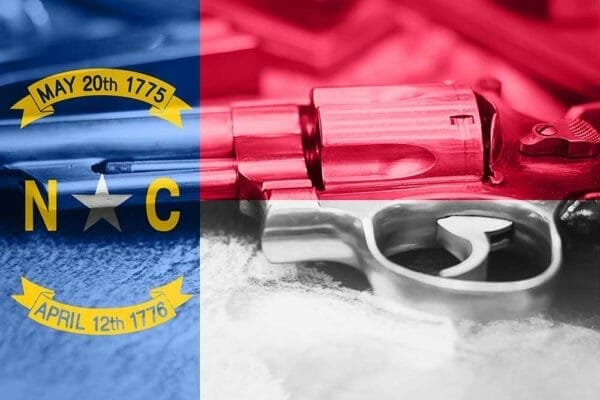
U.S.A. –-(AmmoLand.com)- On 2 July, 2020, the Democrat Governor of North Carolina, Roy Cooper, vetoed Bill H652, also known as “The Second Amendment Protection Act”.
From the Bill:
AN ACT TO PROVIDE THAT A PERSON WHO HAS A CONCEALED CARRY HANDGUN PERMIT MAY CARRY A HANDGUN ON EDUCATIONAL PROPERTY THAT IS THE LOCATION OF BOTH A SCHOOL AND A PLACE OF RELIGIOUS WORSHIP AND TO ENACT THE 2ND AMENDMENT PROTECTION ACT OF 2020.
H625 has three other mild and incremental reforms of North Carolina weapons law.
- Allows a person who allowed their permit to carry to lapse, to renew it within 60 days after the permit expires, without penalty. Similarly the permit may be renewed for up to 120 days, if a qualified refresher course is taken before renewal.
- The bill allows the head of law enforcement agencies to designate non-sworn employees who can carry with a concealed carry permit in law enforcement facilities.
- The bill also allows emergency medical services personal to carry with a concealed carry permit if they have completed an approved course.
None of these reforms is a radical transformation of the law. They are reforms which make the law a bit less restrictive. The bill passed with veto-proof majorities in the North Carolina General Assembly.
Governor Cooper is at odds with the majorities.
On 25 June, the North Carolina House voted to pass H652, Yes-77, No-38, and 5-absent. On the same date, the North Carolina Senate voted Y-33, No-14, and 3 absent.
After Governor Cooper vetoed the bill on 2 July, the General Assembly received H652 back from the Governor the same day. H652 was placed on the calendar for a veto override vote in the House scheduled for 8 July, 2020.
A veto override requires 3/5ths vote of the members present, in both houses. In this case, the bill goes to the House first.
There are 64 Republicans and 56 Democrats in the House. A maximum of 72 votes is needed to override the veto, less if some members are not present.
In the Senate, there are 28 Republicans and 21 Democrats with 1 vacancy. A maximum of 30 votes is needed to override the veto.
Governor Cooper has vetoed five other bills which will be on the Calendar for veto review. In addition to the 2nd Amendment Protection Act, there is H918, H806, H686, H258, and H612.
Governor Cooper has placed the Democrats legislators into a lose-lose situation. If they vote to override the veto, they can be accused of being disloyal to the Democrat Party. If they reverse their previous vote for the bill, they show themselves to be untrustworthy.
Second Amendment rights are popular in North Carolina. It remains to be seen if party loyalty or the desire to be re-elected will win.
The Democrats in the House, who voted for the Second Amendment Protection Act were:
- Rep. Beasly, District 92
- Rep. Bell, District 21
- Rep. Brewer, District 66
- Rep. Farmer-Butterfield, District 24
- Rep. Floyd Elmer, District 43
- Rep. Graham, District 47
- Rep. John Sr., District 40
- Rep. Lucas, District 42
- Rep. Pierce, District 48
- Rep. Queen, District 119
- Rep. Russell, District 93
- Rep. Turner, District 116
- Rep. Wray, District 27
Of those 13 Democrats, 8 will need to vote with all 64 Republicans, to ensure a veto override if all members are present for the veto override.
If the 5 Democrats who were absent for the vote to pass the bill remain absent for the veto override vote, only 5 of the 13 Democrats who originally voted for the bill will be needed to override the veto.
About Dean Weingarten:
Dean Weingarten has been a peace officer, a military officer, was on the University of Wisconsin Pistol Team for four years, and was first certified to teach firearms safety in 1973. He taught the Arizona concealed carry course for fifteen years until the goal of Constitutional Carry was attained. He has degrees in meteorology and mining engineering, and retired from the Department of Defense after a 30 year career in Army Research, Development, Testing, and Evaluation.
